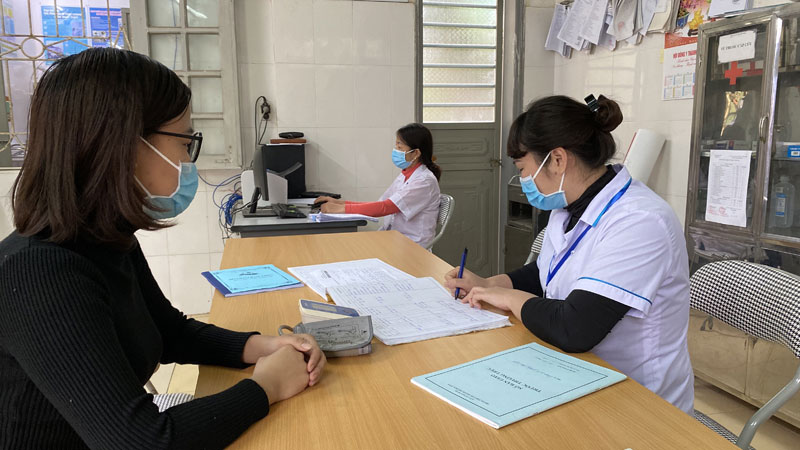
(HBO) – Hoa Binh province hasn’t recorded any cases of COVID-19 so far. Meanwhile, people quarantined at concentrated facilities or at home have felt at ease and seriously complied with regulations on disease prevention and control. This result is partly attributable to communal-level health care network across the province.
 Staff
members of the health station of Huu Nghi ward in Hoa Binh city are on duty
around the clock to receive and handle information about the local COVID-19
situation.
Staff
members of the health station of Huu Nghi ward in Hoa Binh city are on duty
around the clock to receive and handle information about the local COVID-19
situation.
At present, Mai Chau district has 85 people
being quarantined at concentrated facilities and 32 others at home. Doctor Pham
Van Cuong, Director of the district’s medical centre, said in response to the
COVID-19 outbreak, the centre has provided training for staff of communal-level
health stations in diagnosis, treatment, monitoring and quarantine. It has also
conducted fumigation at schools, clinics and crowded places to ensure absolute
safety for local residents and tourists.
Health stations of communes and townships have
proved their important role in the disease prevention and control, he noted,
adding that they have coordinated with local schools, businesses and
authorities to update workers, residents and students on the pandemic situation
and prevention measures.
Recently, people coming to health stations in
Tan Lac district for check-ups and treatment have received guidance on health
protection and COVID-19 prevention measures.
Aside from proposing anti-coronavirus measures
to the district’s steering board for COVID-19 prevention and control, the Tan
Lac medical centre has taken initiative to build concrete scenarios to stay
ready to cope with any circumstance. Besides, it has sent staff to monitor
disease prevention and control activities in communal-level localities while
regularly requesting local health stations to provide people with relevant
advice.
In the spirit of "fighting the pandemic is like
fighting an enemy” and steering clear of over-confidence, communal-level health
stations across Hoa Binh province have kept updated with information,
frequently reviewed their performance so as to give timely guidance in
accordance with new developments of the epidemic situation. They have also got infrastructure
readied for receiving and treating patients, and effectively prevented
cross-infection at medical facilities./.
The Department of Education and Training of Hoa Binh province held a conference on March 18 to review the performance of the "Safe and Happy School" Project and set out tasks for 2025. The project, funded by the Taiwan Fund for Children and Families (TFCF), aims to create a safe, inclusive, and supportive learning environment for students. The event saw the attendance of representatives from the TFCF and 26 beneficiary schools.
With over 70% of their workers being women, trade unions across industrial parks (IPs) in Hoa Binh have been actively safeguarding their legal rights and interests while implementing initiatives to improve their income and well-being.
In recent years, the Hoa Binh provincial General Hospital has continuously innovated itself and improved the quality of medical services to meet the increasing needs of local people. With substantial investments in infrastructure and modern equipment, along with a team of highly qualified doctors and nurses, the hospital has gradually established itself as one of the leading medical units in the Northwestern region and a trusted destination for healthcare for people inside and outside the province.
From mastering the fundamentals of programming to achieving national recognition, the Programming Club of the Le Van Tam Primary School (STAR LVT28) in Hoa Binh city has made remarkable strides in the field of robotics.
The Ho Chi Minh Communist Youth Union Committee and the Vietnam Youth Federation chapter of Hoa Binh province organised a programme on March 12 to launch the "Digital Literacy" movement and an online quiz on the resolutions of the Vietnam Youth Federation congresses at all levels, as well as the Politburo's Resolution No. 57-NQ/TW on breakthroughs in the development of science, technology, innovation, and national digital transformation.
As climate change grows more unpredictable, the development of production forests has become essential - not just for economic growth, but for safeguarding the environment and maintaining ecosystem balance. By boosting local incomes, curbing natural disasters, preventing soil erosion, and protecting water resources, these forests play a crucial role in sustainable development.



 Staff
members of the health station of Huu Nghi ward in Hoa Binh city are on duty
around the clock to receive and handle information about the local COVID-19
situation.
Staff
members of the health station of Huu Nghi ward in Hoa Binh city are on duty
around the clock to receive and handle information about the local COVID-19
situation.